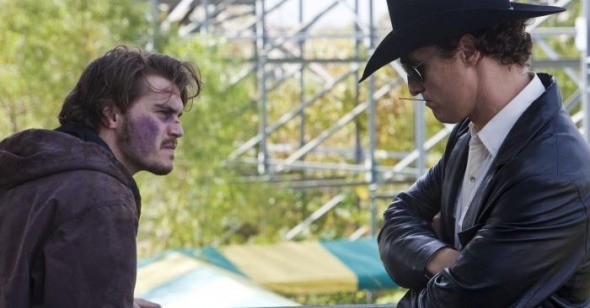By Pasquale Cicchetti
Alexander Sokurov’s Faust, which ended up winning the Golden Lion, provided the perfect conclusion to the thematic pattern I had been tracing out across the screenings of this year’s Venice Film Festival: of redemption achieved through the strictly physical. Sokurov’s take on the classic German legend strips the tale of its Romantic features, reducing it to its primal elements: bodies, money, and material knowledge. Faust—not even old here—is a man struggling to make his way through a world of flesh, hunger, and misery. The whole film is made up of crammed spaces, disturbing close-ups, bodies getting into each other’s way. All personal thematic readings aside, this two-hour-long adaptation is clearly a masterpiece. The mise-en-scène is incredibly dense and layered. In almost every scene, two distinct levels of meaning unfold simultaneously. Sokurov constantly requires the utmost attention to every detail, be they the foreground and background of the shot, the visuals and the soundtrack, dialogue and performance. Overall, the main impression one gets from Faust is of a claustrophobic, material reality. In the end, when the Doctor tears apart his contract with the Devil, it is not to set his soul free: if anything, it is to affirm that—in this dramatic universe—souls have no meaning. The jam-packed mess of life is the only thing that counts, and the human struggle for salvation is as corporeal as everything else.
The remaining prizes awarded by the Jury, chaired this year by American director Darren Aronofosky, seemed to divide the festival audience. Fassbender—whose performance in A Dangerous Method was slightly disappointing—won a richly deserved Coppa Volpi Acting Prize for his role in Shame. The absence of Roman Polanski from the final festival score card raised eyebrows, and so did the choice for Special Prize of the Jury to the very modest Italian film Terraferma by Emanuele Crielese. Ultimately, however, there was general agreement that—especially compared to the controversial results from last year (when Sofia Coppola’s Somewhere walked off with the Golden Lion)—this year’s awards were not so bad after all.
As I was about to leave the Lagoon, a couple of titles were still running through my head. The first was Killer Joe, William Friedkin’s fast-paced, grotesquely enjoyable dark comedy. The plot—based on a play by Tracy Letts—features a dysfunctional Texan family, murderous intrigue, and a ghastly endgame around the dinner table. Matthew McConaughey plays hit man Killer Joe, a charismatic loner who agrees to lend his services in a family affair: a young man (Emile Hirsch) plans to kill his mother to cash in her life-insurance money. Things get complicated when Joe becomes romantically involved with the victim’s daughter, a slightly lunatic Juno Temple, who is also in on the plot. The overall mood of the film, halfway between shabby and surreal, made me think of the Coen brothers, even though the final outcome is slightly more pulpy than witty. Behind the film’s provocative crime story façade is the heart of a deranged western. The entire final sequence, with the family sitting around the dinner table to recite a prayer just before they explode into violence, is an effectively twisted rendition of a distinctively American trope.
My festival experience ended on a more political note. Jafar Panahi, the neorealist-leaning Iranian director currently facing allegations from his government for “colluding with the intention to commit crimes against the country’s national security and propaganda against the Islamic Republic,” was present in spirit with his This Is Not a Film. With this, Panahi has taken the huge risk to challenge the 20-year filmmaking ban imposed on him by the Iranian authorities; the major film festivals around the world—Cannes, Venice, Toronto, New York—have promptly reached out to host his testimony. The film itself is a sort of family movie, shot within the four walls of Panahi's home. We sense his frustration as he explains the subject of the film he was working on before the trial. We see him and his friend Mojtaba Mirtahmasb filming each other while they discuss what a film is really about: the editing, the acting, the story. In the end, we are led to understand that—at least in these conditions—cinema serves as private gesture of resistance. The desire and the right to create images merge, and the invisible struggle against power finds a face and humanity. On the other side the fence, in fact, we sense the presence of a blind power, which, as in the final sequence, restrains the director from going out in the streets with his camera on, and, in doing so, takes away from us the spectacle of fireworks lighting up the Persian night.
